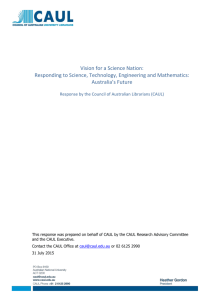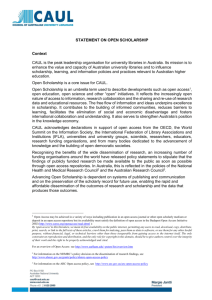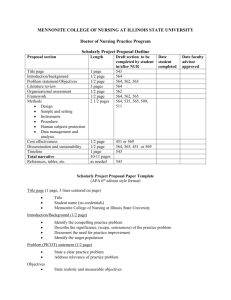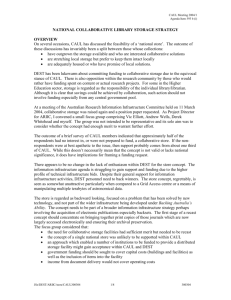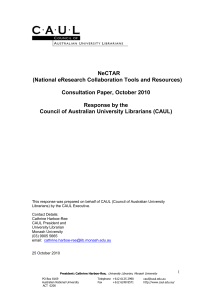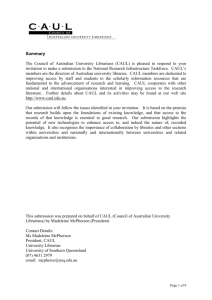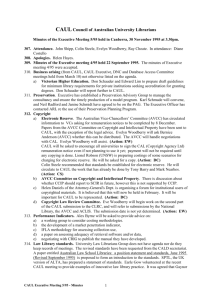DRAFT TEMPLATE
advertisement
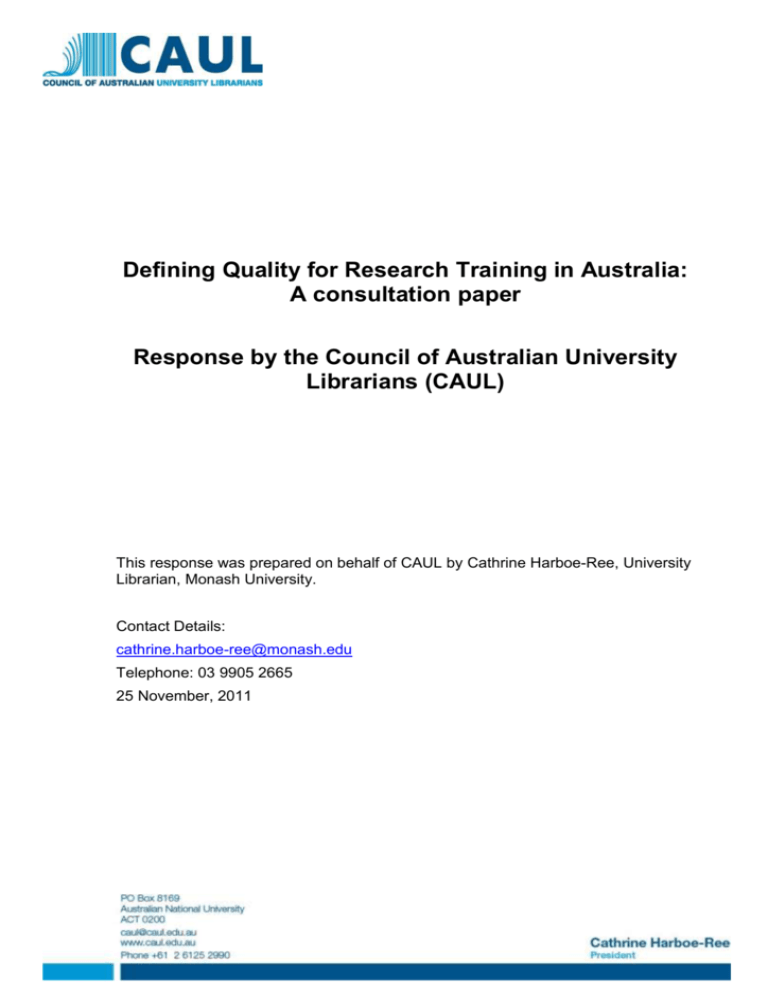
Defining Quality for Research Training in Australia: A consultation paper Response by the Council of Australian University Librarians (CAUL) This response was prepared on behalf of CAUL by Cathrine Harboe-Ree, University Librarian, Monash University. Contact Details: cathrine.harboe-ree@monash.edu Telephone: 03 9905 2665 25 November, 2011 Response The Council of Australian University Librarians (CAUL) is pleased to have the opportunity to contribute to the Defining Quality for Research Training in Australia Consultation Paper. University libraries contribute to a quality research and research training environment by providing: physical study facilities; collections and access to scholarly resources including rich collections of primary research resources in some universities; skills development to enhance students’ ability to locate and use scholarly resources; and the means by which students can disseminate their work, through traditional publishing outlets, institutional repositories or, in many institutions, publishing channels run by the library itself. Taking into account variances across institutions, libraries contribute to skills development by teaching information seeking and use skills, citation and referencing, ethical and proper use of information, copyright requirements, presentation and time management skills, bibliometric analysis, data management and other academic support activities. The method of teaching ranges from the creation of guides to specialist literature, classroom teaching, special seminars and classes, integration of skills development into coursework and teaching of entire research methods programs and units. Generally speaking skills development programs start at undergraduate level, but many are pitched at research level students. This is particularly true of data management training, which addresses the effective creation and use of research data within the Code for the responsible conduct of research. Libraries play an increasing role in e-Research support activities such as data management. There is a strong and growing body of evidence that the training provided by libraries and, indeed active use of scholarly resources, substantially improves student performance. For example, Monash University has demonstrated a positive link between training and student performance, and the University of Wollongong has analysed use of library-provided scholarly resources and shown a strong positive correlation between high library use and student performance. It is in the context of the contribution made by libraries to successful research activity that the following comments are made. 2 Response to specific questions: Consultation Question 1: Should there be national minimum quality requirements for higher degrees by research? Should an institution only be eligible for funding schemes in fields where it meets minimum requirements? While CAUL agrees in principle with this, we think that is more appropriate for universities more broadly to comment on this. Consultation Question 2: Should institutions be required to provide a minimum standard of physical resources in order to receive Research Training Scheme funding? No, CAUL is not in favour of the setting of minimum standards, although guidelines can be helpful. For example, there are guidelines for the amount of space and the number of seats in libraries to be provided per student, and guidelines for expenditure per student on scholarly resources could be developed. Because of the need to make allowance for different university approaches, CAUL is not in favour of a standards approach. On the other hand, CAUL would like to see scholarly resources included in any discussions about infrastructure support, as this is not mentioned in the Consultation Paper. Scholarly resources includes collections for research within the institution and mechanisms for access to external collections, including both electronic and hardcopy. Consultation Question 3: Should universities providing research training be required to ensure that students have sufficient access to opportunities such as conference attendance and international study? Yes, and this should include the provision of opportunities for dissemination of research outputs, such as institutional publishing, repositories etc, particularly where traditional publishers’ timeframes or requirements do not allow for timely dissemination of research findings, and for research data dissemination. Consultation Question 4: What is the best way of ensuring that PhD supervisors provide high quality support to students? Should requirements be nationally consistent? While this is another area where it is probably more appropriate for other areas of universities to comment, it should be noted that supervisors are not the only cohort providing components of research training to students, and so the question may be too narrow. 3 Consultation Question 5: Given that positive Excellence in Research for Australia (ERA) results provide evidence of a quality research training environment at an institution, should an institution be able to provide alternative evidence of a quality research environment when positive ERA results are absent (for example in an emerging area of research). If so, what alternative evidence should be provided? In emerging areas newer mechanisms for dissemination of research should be recognised, such as institutional publishers, repository environments including disciplinary, institutional both national and international, with identified measures. Consultation Question 6: If an institution is unable to provide robust evidence of a quality research environment, should it be able to submit evidence of arrangements, such as partnering arrangements with another institution, that effectively compensate for its inability to provide a quality research environment without such arrangements? Yes, provided that the partnering arrangements include a range of resources, services and programs provided by libraries, as outlined above, and as appropriate. Consultation Question 7: Should government do more to enable research training in multidisciplinary environments? What barriers are there and how might they be overcome? Barriers include opportunities for dissemination of research outputs. For rapidly emerging multidisciplinary areas encouragement and recognition of dissemination through emerging mechanisms and processes, such as repositories, institutional publishers with technology enabled rapid turnaround environments with minimal cost for researchers. This and further encouragement of dissemination of research data would enable the establishment of sharable research outputs to build rapidly multidisciplinary research. Some barriers exist for developing positive relationships between policies and practices in research data management, ethics and intellectual property. For example, evidence suggests that it is easier to gain clearance from ethics committees if data remains restricted, discouraging researchers from sharing their data in any usable way Further government encouragement for an holistic approach to research in these areas would improve information sharing through open access and other initiatives. 4 Consultation Question 8: Should Australian higher degrees by research include broader skills training? If so, should this be through compulsory coursework or through some other mechanism? Yes, broader skills training should be an essential component of Australian higher degrees by research, particularly within the disciplinary context, using recognised frameworks and standards, within the coursework curricula. Partnerships within the disciplinary contexts would include engaging with those who have knowledge of the discipline and the broader skills development requirements to provide a disciplinary interpretation in the skills training. Within disciplinary and institutional contexts, using agreed benchmarks or frameworks that interrelate with the broader skills training program, external, internal or mixed programs might be established, such as with industry, commerce, professional agencies and bodies, and with other parts of the institution. New skills are required in all disciplines in the management of research data, not just as a compliance issue but as the means of producing globally-relevant research in the new knowledge environment. This applies not just to researchers who produce large data sets and use high performance computing. Uncurated data in small datasets remains inaccessible (dark) if researchers do not have the skills to manage it or do not know how to express their needs to those who can help with preservation, curation, discovery and retrieval (that is, data scientists and librarians). 5


